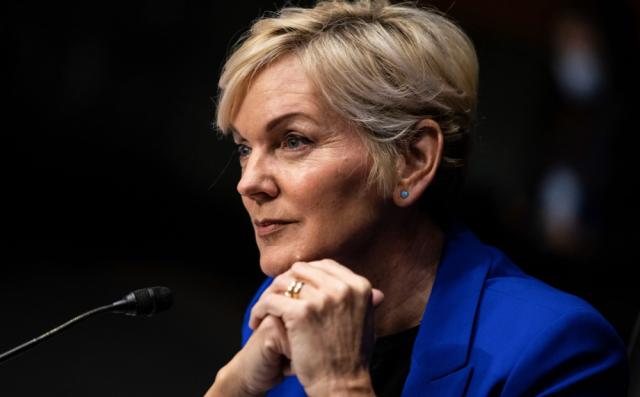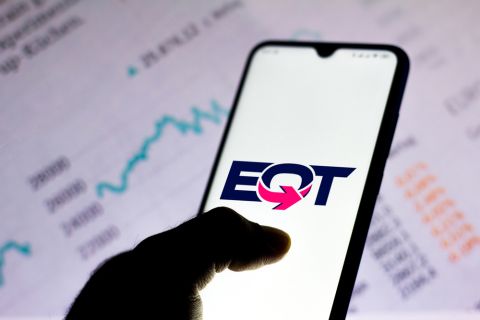
“I’ve met with lots of oil and gas industry executives in the last year and a half,” Granholm said on June 16. “And I’ve constantly tried to impress upon them the need to look to the future.” (Source: John Papadopoulos / Shutterstock.com)
U.S. Secretary of Energy Jennifer Granholm is adamant the Biden Administration is aggressively pursuing clean energy and carbon reduction technology development in order to meet President Biden’s goals for climate action.
“We’re pursuing the most ambitious goals for climate action in history: cut emissions in by 2030, reach 100% clean electricity by 2035, and achieve net-zero by 2050,” Granholm recently said at the Global CCS Institute’s 10th Annual DC Forum.
Granholm acknowledged at the event on June 16 that Biden’s energy agenda is “facing real headwinds,” but said such action is essential “to the country’s long-term health.”
Climate change, she insists, isn’t put on hold for global conflicts, referencing Russia’s war with Ukraine that has upended the world’s energy crisis and lingering effects of COVID-19 causing supply chain issues.
“The math is simple,” she said. “We have to cut emissions essentially in half by the end of this decade to avoid the worst of climate change.”
Granholm believes that hope lies in clean energy. But in order to achieve the lofty carbon reduction goals, it would take a multitude of efforts and technologies deployed around the world.
“Some are ready to go right now: solar, wind, [electric vehicles],” she said. “As my colleagues can tell you, my mantra is deploy, deploy, deploy. And those renewable options have to be our priority. They are our priority.”
Speaking at the DC Forum, Granholm pushed for companies relying on fossil fuel production to diversify into renewable sources and cleaner energy production.
At the event, Granholm spoke immediately after Occidental Petroleum CEO Vicki Hollub, whose company is heavily involved in carbon capture for use in its EOR operations and is investing $1 billion in a direct air capture facility in the Permian Basin. Her remarks also come a week before she is set to meet with oil executives from Exxon Mobil Corp., Shell Plc, Valero Energy Corp., Marathon Petroleum Corp., Phillips 66, BP Plc and Chevron Corp. to seek solutions to lowering increasingly rising gas prices.
“I’ve met with lots of oil and gas industry executives in the last year and a half,” she said on June 16. “And I’ve constantly tried to impress upon them the need to look to the future, to get their businesses skating to where the puck is going, to diversify their portfolio from just oil and gas into broader energy offerings.”
The Biden Administration appointed Dr. Jennifer Wilcox as Principal Deputy Assistant Secretary for the Office of Fossil Energy and Carbon Management—itself having been renamed from the Office of Fossil Energy.
Wilcox is the author of the first textbook on carbon capture, Carbon Capture, published in March 2012.
“[The office’s] central focus has shifted over time from simply increasing fossil fuel production in the U.S. to advancing the approaches and technologies that will minimize climate and environmental impacts from our continued—yet also, over time, shrinking—dependence on fossil fuels,” Granholm said.
Over the last two decades, the office has overseen billions of dollars of investment into carbon management technologies, according to Granholm.
Such technology development will likely see a boost as a result of President Biden’s Infrastructure Law. The legislation allocated $12 billion to invest in next-generation carbon capture, direct air capture and industrial reduction demonstration projects, along with CO₂ transport and storage infrastructure.
“Ultimately, our vision involves testing these technologies both inside and outside the United States, building up as much of the necessary supply chains as we can here, and filling any gaps with allies who share our values,” Granholm said. “And then, when we’ve successfully commercialized these technologies, exporting them all over the globe.”
Recommended Reading
PHX Minerals’ Borrowing Base Reaffirmed
2024-04-19 - PHX Minerals said the company’s credit facility was extended through Sept. 1, 2028.
SLB’s ChampionX Acquisition Key to Production Recovery Market
2024-04-19 - During a quarterly earnings call, SLB CEO Olivier Le Peuch highlighted the production recovery market as a key part of the company’s growth strategy.
BP Restructures, Reduces Executive Team to 10
2024-04-18 - BP said the organizational changes will reduce duplication and reporting line complexity.
Matador Resources Announces Quarterly Cash Dividend
2024-04-18 - Matador Resources’ dividend is payable on June 7 to shareholders of record by May 17.
EQT Declares Quarterly Dividend
2024-04-18 - EQT Corp.’s dividend is payable June 1 to shareholders of record by May 8.





